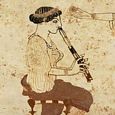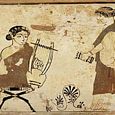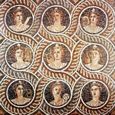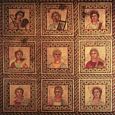EUTERPE
Greek Name
Ευτερπη
Transliteration
Euterpê
Latin Spelling
Euterpe
Translation
Well Pleasing
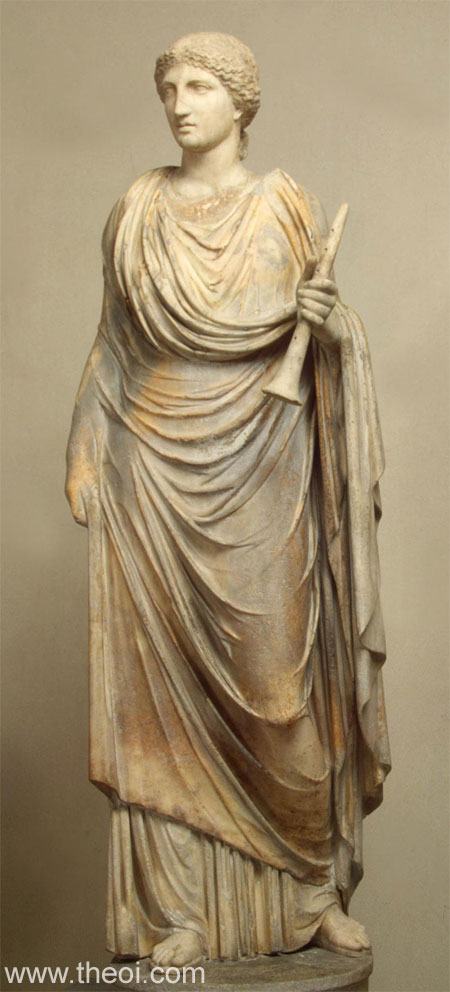
EUTERPE was one of the nine Mousai (Muses), the goddesses of music, song and dance. In the Classical era, when the Mousai were assigned specific literary and artistic spheres, Euterpe was named Muse of lyric poetry. Her attribute was the double-flute. Euterpe's name was derived from the Greek words eu- and terpô, meaning "giver of much delight."
FAMILY OF EUTERPE
PARENTS
ZEUS & MNEMOSYNE (Hesiod Theogony 75, Apollodorus 1.13, Diodorus Siculus 4.7.1, Orphic Hymn 76)
OFFSPRING
RHESOS (by Strymon) (Apollodorus 1.18)
CLASSICAL LITERATURE QUOTES
Hesiod, Theogony 75 ff (trans. Evelyn-White) (Greek epic C8th or C7th B.C.) :
"The Mousai (Muses) sang who dwell on Olympos, nine daughters begotten by great Zeus, Kleio (Clio) and Euterpe, Thaleia (Thalia), Melpomene and Terpsikhore (Terpsichore), and Erato and Polymnia (Polyhymnia) and Ourania (Urania) and Kalliope (Calliope)."
Orphic Hymn 76 to the Muses (trans. Taylor) (Greek hymns C3rd B.C. to 2nd A.D.) :
"Daughters of Mnemosyne and Zeus . . . Kleio (Clio), and Erato who charms the sight, with thee, Euterpe, ministering delight : Thalia flourishing, Polymnia famed, Melpomene from skill in music named : Terpsikhore (Terpsichore), Ourania (Urania) heavenly bright."
Pseudo-Apollodorus, Bibliotheca 1. 13 (trans. Aldrich) (Greek mythographer C2nd A.D.) :
"Mnemosyne [bore to Zeus] the Mousai (Muses), the eldest of whom was Kalliope (Calliope), followed by Kleio (Clio), Melpomene, Euterpe, Erato, Terpsikhore (Terpsichore), Ourania (Urania), Thaleia (Thalia), and Polymnia."
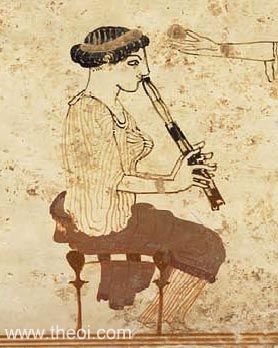
Pseudo-Apollodorus, Bibliotheca 1. 18 :
"Euterpe--or Kalliope (Calliope), according to some--bore to the river Strymon Rhesos (Rhesus), whom Diomedes murdered at Troy."
Diodorus Siculus, Library of History 4. 7. 1 (trans. Oldfather) (Greek historian C1st B.C.) :
"Hesiod even gives their names [the Muses'] when he writes : ‘Kleio, Euterpe, and Thaleia, Melpomene, Terpsikhore and Erato, and Polymnia, Ourania, Kalliope too, of them all the most comely.’
To each of the Mousai (Muses) men assign her special aptitude for one of the branches of the liberal arts, such as poetry, song, pantomimic dancing, the round dance with music, the study of the stars, and the other liberal arts . . . For the name of each Mousa (Muse), they say, men have found a reason appropriate to her . . . Euterpe, because she gives to those who hear her sing delight (terpein) in the blessings which education bestows."
Cicero, De Natura Deorum 3. 18 (trans. Rackham) (Roman rhetorician C1st B.C.) :
"What about the sons of goddesses? . . . [such as] Rhesus, whose mother [i.e. Euterpe] was a Musa (Muse)."
ANCIENT GREEK & ROMAN ART
SOURCES
GREEK
- Hesiod, Theogony - Greek Epic C8th - 7th B.C.
- Apollodorus, The Library - Greek Mythography C2nd A.D.
- Diodorus Siculus, The Library of History - Greek History C1st B.C.
- The Orphic Hymns - Greek Hymns C3rd B.C. - C2nd A.D.
ROMAN
- Cicero, De Natura Deorum - Latin Rhetoric C1st B.C.
BIBLIOGRAPHY
A complete bibliography of the translations quoted on this page.
